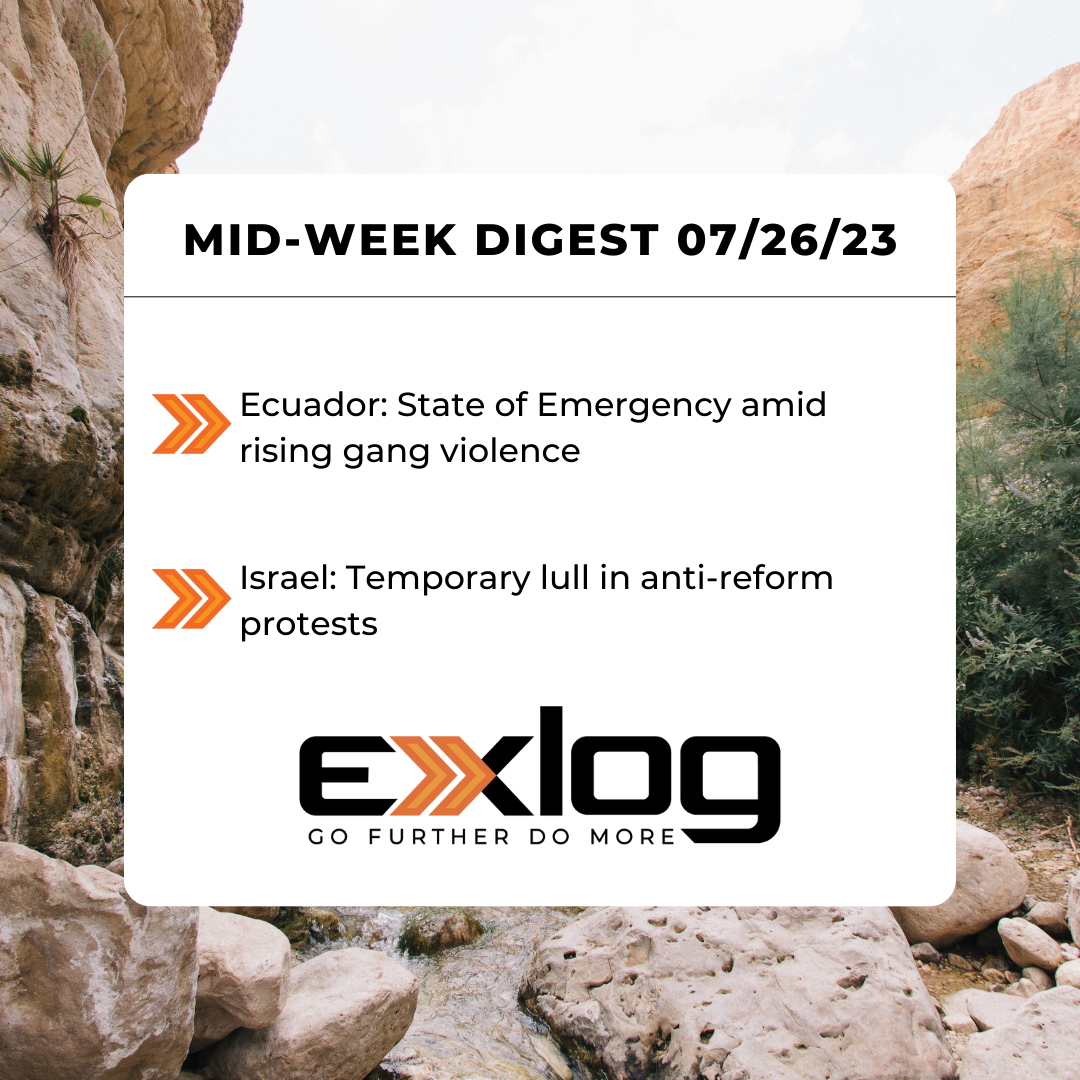State of Emergency in Ecuador and reform protests pause in Israel
Ecuador: Lasso declares State of Emergency amid rising gang violence
Ecuadorian President Guillermo Lasso declared a 60-day State of Emergency (SoE) throughout the country’s prisons and nightly curfews in three coastal areas on July 24 following a wave of violent attacks that killed at least 20 people between July 22-23. The government implemented a 2200-0500 curfew in the provinces of Manabí and Los Ríos, as well as in the municipality of Durán, after a gunman shot and killed the mayor of Manta (the capital of Manabí Province) on July 23. The decision to introduce the SoE was announced amid severe clashes between criminal groups at the Litoral Penitentiary in the city of Guayaquil and a string of protests at various jails in the provinces of Cotopaxi, Azuay, Cañar, El Oro, and Napo in which inmates took 96 guards hostage. Under the SoE, the government has mobilized the military and police to stabilize the security environment in the country’s prisons; approximately 2,700 soldiers stormed the Litoral prison on July 25 to restore order and seize weapons used in the riots. In apparent retaliation against the measure, gangs conducted a series of attacks using firearms and explosive devices targeting government offices and gas stations in the northern coastal province of Esmeraldas on July 25. The attacks prompted the local government to deploy the military to secure government, medical, and energy facilities across the state and suspend school operations in the city of Esmeraldas and the towns of Atacames and Quinindé until at least July 28 – in addition to urging closures of public and private entities in the canton of Esmeraldas until further notice. The security environment in Ecuador’s coastal provinces – key regions for transnational drug trafficking – has significantly deteriorated in recent years due to territorial disputes among local gangs, some of which are affiliated with Colombian and Mexican drug trafficking organizations. Gang violence in Ecuador’s prisons is also a long-standing issue due to overcrowding, personnel shortages, and allegations of corruption among prison authorities. Persistent political instability has limited the government’s ability to respond to rising insecurity, and Ecuador’s role as a major transit and distribution center for illegal narcotics indicates that an improvement in the overall security environment is unlikely in the medium term.
Israel: Temporary lull in violent anti-reform protests
Israel is experiencing a temporary period of relative calm after the most recent protests against controversial judicial reform legislation escalated to violence. Hundreds of thousands of protesters demonstrated across the country on July 24 following the passage of Supreme Court reforms by the legislature (Knesset) earlier that day. Clashes between protestors and police took place outside of the Parliament Building in Jerusalem and at roadblocks along the Ayalon Highway in Tel Aviv. Police in both Jerusalem and Tel Aviv used water cannons to disperse protesters blocking highways, which reportedly remain clear. As of the morning of July 25, the streets around the Parliament and Supreme Court in Jerusalem were deserted, and a nearby park that had housed a tent city of demonstrators for four days had been cleared. That same day, thousands of Israeli doctors across the country held a strike in protest of the judicial reforms. Israel’s Histadrut trade union confederation has threatened a general strike for an as-yet-undetermined date, and thousands of military reservists have vowed not to report for duty if the law is allowed to stand. According to most estimates, hundreds of thousands of Israelis representing 20% of the national population have participated in the protests since January 2023 when the judicial reforms were first proposed. With no written constitution, the relatively powerful Israeli Supreme Court functions as the only check on the executive and legislative branches – both of which are controlled by the governing coalition. While the judicial reforms were voted into law by the Knesset on July 24, the Supreme Court has announced it will hear challenges to the law in September after the Knesset returns from recess. Given the demonstrated resolve of the protestors over the past seven months and the anticipated judicial review of the law, further unrest is likely in Israel in the next two months.


